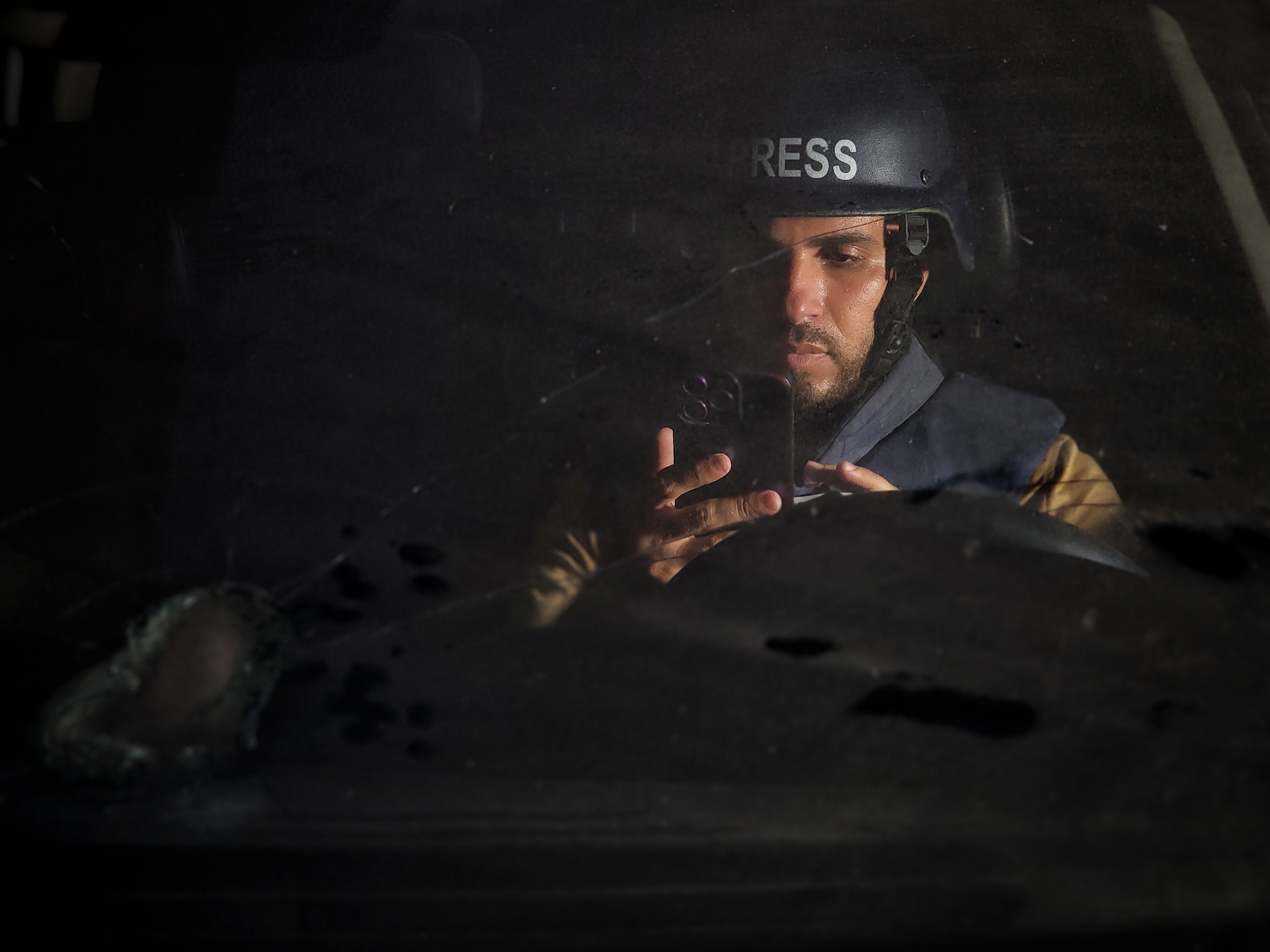يحرص الإعلامي لدى تناوله أي حدث على أن يمتاز بالموضوعية في الطرح؛ فلا ينحاز إلى جهة أو إلى موقف على حساب الجوانب الأخرى. وفي حالة الإبادة الجماعية في غزة -التي يطغى فيها الجانب الإنساني بحكم الأمر الواقع- تُطرح أسئلة تبدأ من التأثير النفسي الذي تشكله هذه القضية على الإعلامي، التي ربما تؤثر على قدرته على الأداء، والحفاظ على قيم الموضوعية والحياد.
فعلى الرغم من تغطيتي حروبا متعددة، واعتيادي على مشاهد القصف والدمار، فإن مشاهد القتل والإبادة الجماعية للسكان شكلت حدثا نفسيا مؤثرا. ومع امتداد زمن هذه الإبادة لأشهر طويلة زادت على سنة، أصبح التعامل مع هذا الحدث يتطلب جهودا خاصة من المختصين، ويستلزم اتخاذ إجراءات تراعي الصحة النفسية للإعلامي.
ماذا يقول الطب النفسي؟
تعتقد الدكتورة مايا دبوق، المعالجة النفسية، أن "ما يجري في غزة يشكل حدثا صادما، ويتعاطى معه المتلقي بانفعالية عالية، ولا يستطيع الإنسان عند حدث مماثل أن يكون حياديا، أو موضوعيا. ومذيع الأخبار في مقدمة الحدث، ويشعر بالمسؤولية، ومن ثَم يكون عرضة للشعور بالإحباط؛ إذ يحمِّل نفسه المسؤولية، ويشعر بأنه يجب مساعدة هؤلاء الضحايا".
وللخروج من هذه الحالة، ترى دبوق أنه "يجب على الإعلامي أن يساعد نفسه وأن يكون قويا عبر أخذ فترات راحة بعيدا عن الأخبار، وألا يجلد نفسه؛ فبالنهاية هذا ما يستطيع تقديمه. وعلى إدارة القنوات أخذ هذه الأمور بالحسبان عبر تقديم المساعدة النفسية للإعلاميين، ولا سيما أنها قد تؤثر عليهم بعد نهاية الأحداث".
تعتقد الدكتورة مايا دبوق، المعالجة النفسية، أن "ما يجري في غزة يشكل حدثا صادما، ويتعاطى معه المتلقي بانفعالية عالية، ولا يستطيع الإنسان عند حدث مماثل أن يكون حياديا، أو موضوعيا. ومذيع الأخبار في مقدمة الحدث، ويشعر بالمسؤولية، ومن ثَم يكون عرضة للشعور بالإحباط؛ إذ يحمِّل نفسه المسؤولية، ويشعر بأنه يجب مساعدة هؤلاء الضحايا".
تجارب حية
هدى حسين، إعلامية لبنانية تعمل في قناة "فلسطين اليوم"، ترى أن التحدي الأصعب هو مشاهد الإبادة خلال ساعات العمل، ما ولّد شعورا لديها بأنها في قلب الصراع. وتضيف أن "الأمر لم يتوقف عند عدم القدرة على التأقلم فحسب، بل تعداه إلى التأثير على صحتها الجسدية". ولم يمنع عملها لسنوات طويلة في الإعلام أن يغالبها الدمع في الأستوديو في بعض الأحيان؛ إذ أثرت مشاهد الإبادة الجماعية على أدائها بطريقة أو بأخرى.
ولا تختلف شهادة الزميلة فرح صلاح، التي تعمل في قناة "نبأ"، والتي عبرت عن عدم قدرتها على اعتياد مشاهد المجازر أو رؤيتها لفترة طويلة، والشعور بالخيبة والتقصير يلازمانها؛ فهي لا تملك الكثير لتقديمه إذ تشعر أن أهل غزة يستحقون الأكثر، "ومثل هذه القضايا لا تحتمل أن يكون الصحفي حياديا".
بدوره، يشير الزميل محمد دياب، الذي يعمل في القناة نفسها، إلى حجم الضغوط النفسية التي عانى منها بسبب مشاهد الإبادة الجماعية، لكنه "ينظر إلى نفسه كمقاوم يؤدي مهمته من خلال الإعلام، وهذا يفرض مزيدا من التحمل، وأن يكون في مستوى الحدث".
"الإعلامي وإن كان سيتأثر بمشاهد الإبادة الجماعية وجدانيا وعاطفيا، فإنه يعمل في قناة ويخضع لسياساتها، ومن ثَم فلا يجب ترك مسألة الأحاسيس تجره إلى اتجاهات معينة بالعمل، وحتى على منصات وسائل التواصل الاجتماعي؛ فهو عرضة للقيود ولا يستطيع أن يعبّر كيفما يريد، والإعلامي إنسان في نهاية المطاف".
وعايش الزميل باسل القاضي، ابن غزة الذي يعمل في قناة "فلسطين اليوم" في لبنان، مواقف كثيرة في أثناء تغطية الحرب، لكن أصعبها عندما تلقى خبر استشهاد ابن خاله "خليل" قبل ربع ساعة من دخوله الأستوديو، واصفا هذا الشعور بأنه من أصعب اللحظات.
الوضع نفسه يعيشه أحمد ليلى الذي يعمل في منصة "قدسنا"، وهي قناة إلكترونية تبث مباشرة على الإنترنت؛ إذ وجد صعوبة في تقديم النشرات بسبب المجازر المتواصلة والمجاعة التي حلت بالناس، فحاول لاحقا تجنب مشاهد الإبادة، والتركيز على متابعة الجانب التحليلي والسياسي. ويضيف أنه حاول كثيرا تجنب الضغط النفسي، لكنه لم لكن يفلح في ذلك في بعض الأحيان، وفي واحدة من المشاهد المؤثرة، رغب في ألا يستكمل إحدى حلقات التغطية المباشرة.
تَطرَح قيمة الموضوعية إزاء هذا الوضع معضلة مهنية حقيقية؛ إذ ترى ليلى أنه لا يمكن الحفاظ عليها "في ظل المجازر المتواترة، والمطلوب من الإعلامي أن يتعاطى إنسانيا مع حدث كهذا، فلا حياد مع الإجرام، ولا حياد مع الإبادة الجماعية، والإعلام رسالة، ولا يمكن أن نُتَّهم بأننا منحازون".
تجربة الزميل أمجد أبو سيدو ليست استثناء مقارنة بزملائه الآخرين، وهو الذي يقدم برنامج "الشارح" عبر منصة "سما القدس"؛ إذ يصف الأثر النفسي لمشاهد الإبادة بـ"الرهيب، وأنه يفوق القدرة على التقبل، مهما كان المرء معتادا على مشاهدتها بحكم المهنة".
وترى أستاذة الإعلام في الجامعة اللبنانية، الدكتورة حياة الحريري، أن "الإبادة الجماعية تشكل ضغطا إضافيا على الصحفيين، وخصوصا المراسلين، فالخوف مزدوج؛ على العائلة أولا، وما تشكله تلك المشاهد من أزمة نفسية ثانيا، وهي أزمة لا ينجو منها كذلك المذيع في الاستوديو، وستؤثر بشكل أو بآخر نسبيا على أداء المهام بالشكل المطلوب".
"الإبادة الجماعية تشكل ضغطا إضافيا على الصحفيين، وخصوصا المراسلين، فالخوف مزدوج؛ على العائلة أولا، وما تشكله تلك المشاهد من أزمة نفسية ثانيا، وهي أزمة لا ينجو منها كذلك المذيع في الاستوديو، وستؤثر بشكل أو بآخر نسبيا على أداء المهام بالشكل المطلوب".
ومن وجهة نظرها، فإن الموضوعية تأتي في المرتبة الثانية في حدث الإبادة الجماعية؛ "فالمشهد الإعلامي بشكل عام هو مشهد مهني"، وتضرب مثالا بقناة الجزيرة بوصفها نموذجا في تحمل تلك الظروف والاستمرار في تغطية الإبادة الجماعية بمهنية. والحقيقة أن "الموضوعية في هذا الحدث تقضي بأن "إسرائيل" ترتكب المجازر، وهناك شعب يتعرض للإبادة ويرفض التهجير، ويقاوم".
أما الدكتور أحمد رفيق عوض، أستاذ الإعلام في جامعة القدس، فيرى أن "الإعلامي وإن كان سيتأثر بمشاهد الإبادة الجماعية وجدانيا وعاطفيا، فإنه يعمل في قناة ويخضع لسياساتها، ومن ثَم فلا يجب ترك مسألة الأحاسيس تجره إلى اتجاهات معينة بالعمل، وحتى على منصات وسائل التواصل الاجتماعي؛ فهو عرضة للقيود ولا يستطيع أن يعبّر كيفما يريد، والإعلامي إنسان في نهاية المطاف".
ويشرح عوض وجهة نظره قائلا: "لا يجب على القضايا الإنسانية أن تغطي على المشهد الأمني والسياسي. في حالة غزة مثلا، فإن التركيز على الجانب الإنساني على حساب بقية القضايا يعني توقف الحرب بأي ثمن، وفيه نوع من التهرب". أما الموضوعية في القضايا الإنسانية فيرى أنها "مفهوم غربي، وهي فخ؛ لأنها تساوي بين الضحية والجلاد، وهذا أمر لا يمكن المساومة عليه، مثل قضايا الحريات.








































